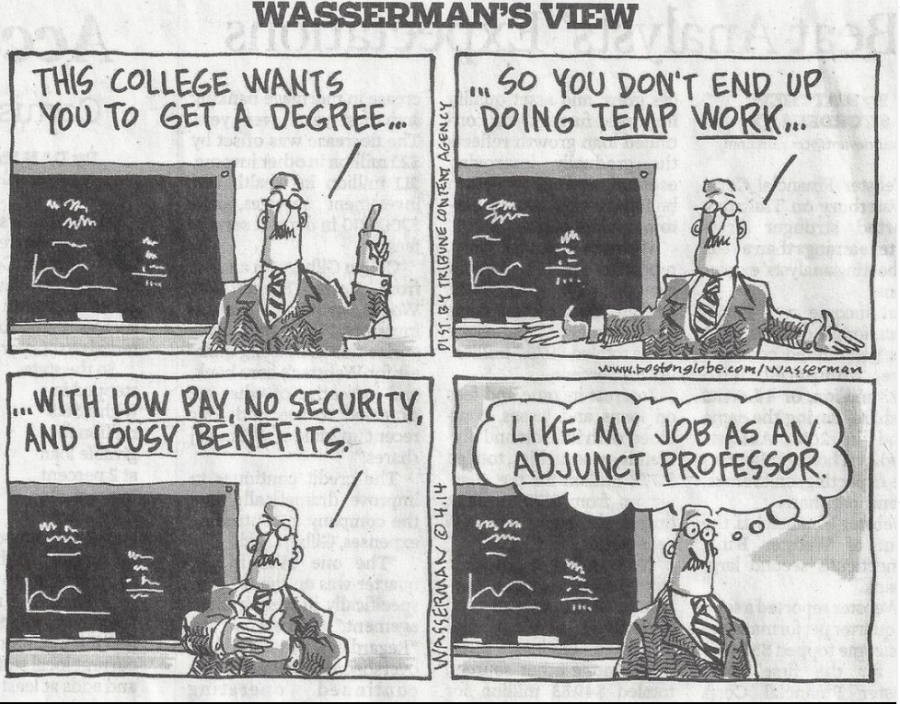Adjuncts: the unappreciated, underpaid, unseen academics of American universities
January 1, 2022
The year is 1994. Mikhail Gorbachev has opened the gates of the Soviet Union, thus releasing a tidal wave of thousands of Russians all desperately sloshing their way into Brooklyn. English Second Language (ESL) classes are now overflowing with international students leading Brooklyn College to hire fifteen new adjunct professors to take care of the sudden surplus. Of the fifteen was Mark. Apparently, Mark, a former student of Brooklyn College, present junior high history teacher, came to mind as one of the college deans waded through the tsunami of new students, all because of his prior success in tutoring international students. With no background in teaching ESL or fluency in Russian whatsoever, remarkably, he said yes. With knuckles cracked and a chest puffed, he got to work — this was his first job as a professor.
Since his first class, Mark-Ameen Johnson fell head over heels with professor-ism. Twenty-seven years later, he now teaches English at the University. This semester, I had the privilege of seeing him in his natural habitat. On the first day of classes, Johnson shared his story about how he first started teaching at universities, successively taking out a variety University faculty IDs. Pace University, New York University, St. Francis College, Brooklyn College, College of Staten Island. I was fascinated. How absolutely romantic it must be to have the opportunity to work for all these schools.
At the time I was shamelessly undecided yet despite my confusion, I knew that at some point in my life, I too wanted to be swept off my feet by professor-ism. I decided to bring it up to him one day after class, his usually gleeful expression quickly replaced with a look of warning. “I love my job, but oh the wretched state many professors are in!”
He then went on to explain that his scattered employment across the boroughs was out of necessity rather than sentimentality. Despite working as an academic for nearly three decades, Johnson had become one of the 700,000 adjunct professors teaching at American universities today.
The Thrill of Being an Adjunct
Depending on who you ask, being an adjunct can be defined as many things. Most of the time, if you ask an adjunct professor what it means to them, typically they’ll respond that it’s about the same as being a tenured professor, except you just don’t get the benefits, salary, stability or security. Instead, you get the thrill of class-hunting at multiple universities and picking up odd jobs to pay rent and buy groceries.
The Life of an Adjunct Professor
Today, over 50 percent of professors don’t have access to tenure, leading them to the gripping lifestyle of adjunction. In comparison to tenured professors, adjuncts are paid by the hour or credit and aren’t guaranteed classes to teach each semester. Their jobs aren’t secured and their benefits vary depending on the university.
The cost of higher education has increased 1,200 percent since 1980, yet 22 percent of the individuals doing the actual educating part live below the poverty line. Professors commuting hours between universities, not being able to afford health care or electricity, working two to three jobs just to make ends meet, even living out of their cars grading papers by street lamplight. This is the harsh reality of the lives of our American scholars.
Do parents paying for their children’s higher education want their role models living off of food stamps? Or working so many jobs they don’t have the time to organize lesson plans or grade papers to the best of their ability?
If you’re someone who has filed for student loans in the past 40 years, you also might be curious as to where all that money went, if not to them. You could try asking Chancellor James Milliken who became pretty intimate with university funding before being replaced in 2019; most likely because he was using CUNY students’ loans to pay the $18,000 monthly rent on his apartment.
There have been attempts to unionize. At a rally back in 2019, CUNY professors protested, demanding a double in adjunct pay so they could make livable wages. They were sick of universities increasing tuition and exploiting their labor for a measly $28,000 annual payout — which is minimum wage.
When I asked Johnson his opinion on the adjunct union in NYC, he said he one hundred percent supports unions on principle, but as we’ve learned, most adjunct professors are overworked as it is, without much of an open schedule leading union efforts to be largely unsuccessful.
Oh Yeah, And There’s a Pandemic
As stated earlier, tenure provides not only financial stability but job security, something 2,800 adjunct professors lacked during CUNYs mass layoff in July 2020. Among the thousands of adjuncts suddenly put out of work was Johnson.
“I lost a lot of money in lost classes and freelance work during the pandemic and will be working on my finances, which were never great since adjuncting does not pay well, for some time to come. Some people gave up on teaching all together. I have been lucky, though, that at NYU people who knew me and my work found other places for me to teach there so that I did not lose my medical plan or adjunct seniority. Not everyone was so lucky.”
Johnson also pointed out that many universities let go of a lot of faculty only to hire new ones, firing everyone that’s been faithful to the school and replacing them with staff with minimal loyalty. This lack of loyalty makes it possible for professors to leave mid-semester or not put their all into teaching — thus putting students’ education at risk.
What This Says About Universities
Universities pride themselves on their passion for education. But a sense of curiosity amongst the student body questions how much a university can truly care about their quality of education if they do not care the same for their educators.













Rita Sparo • Jan 23, 2022 at 7:54 pm
Great article written by my Granddaughter Gianna. Obviously she’s enjoying college. Keep it up.